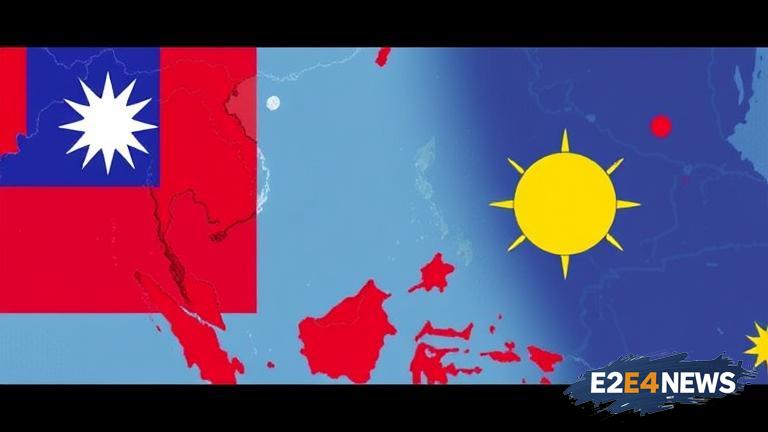Taiwan’s New Southbound Policy, launched in 2016, aims to enhance cooperation with 18 countries in Southeast Asia, South Asia, and the Pacific. The policy has yielded significant results, with Taiwan’s trade with these countries increasing by 20% in 2020. The policy focuses on six key areas: economic cooperation, talent exchange, resource sharing, regional links, people-to-people diplomacy, and innovative industries. Taiwan has established bilateral trade agreements with several Southeast Asian countries, including Singapore, Malaysia, and the Philippines. The policy has also promoted cultural exchange, with Taiwan hosting numerous cultural events and exhibitions featuring Southeast Asian art, music, and cuisine. In addition, Taiwan has launched various scholarship programs and language training initiatives to promote people-to-people diplomacy. The policy has also encouraged Taiwanese businesses to invest in Southeast Asia, with many companies setting up operations in countries such as Vietnam and Indonesia. Furthermore, Taiwan has strengthened its ties with Southeast Asian nations through regional organizations such as the Association of Southeast Asian Nations (ASEAN). The policy has also promoted cooperation in areas such as agriculture, healthcare, and disaster prevention. Taiwan has provided humanitarian aid to Southeast Asian countries affected by natural disasters, such as the 2018 Sulawesi earthquake in Indonesia. The policy has also encouraged the development of innovative industries, such as renewable energy and biotechnology. Taiwan has established research centers and innovation hubs in Southeast Asia, providing a platform for scientists and entrepreneurs to collaborate and develop new technologies. The policy has also promoted tourism, with Taiwan launching various tourism initiatives and campaigns to attract visitors from Southeast Asia. In 2020, Taiwan received over 2 million visitors from Southeast Asia, a significant increase from previous years. The policy has also strengthened Taiwan’s ties with Southeast Asian nations in the area of education, with many Taiwanese universities establishing partnerships with universities in Southeast Asia. Taiwan has also launched various initiatives to promote Mandarin language training and cultural exchange programs for Southeast Asian students. The policy has also encouraged the development of small and medium-sized enterprises (SMEs) in Taiwan, with many SMEs exporting their products to Southeast Asia. In addition, Taiwan has established a number of trade offices and representative offices in Southeast Asia, providing support and assistance to Taiwanese businesses operating in the region. Overall, Taiwan’s New Southbound Policy has been successful in promoting economic cooperation, cultural exchange, and people-to-people diplomacy with Southeast Asian nations, and is expected to continue to play an important role in shaping Taiwan’s foreign policy in the years to come. The policy has also contributed to the growth of Taiwan’s economy, with exports to Southeast Asia increasing by 15% in 2020. The policy has also promoted cooperation in areas such as transportation and logistics, with Taiwan investing in the development of transportation infrastructure in Southeast Asia. Taiwan has also launched various initiatives to promote e-commerce and digital trade with Southeast Asia, providing a platform for Taiwanese businesses to expand their online presence in the region.





